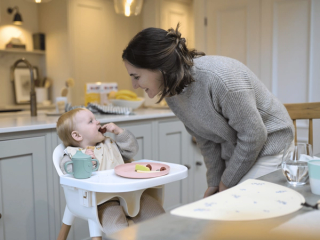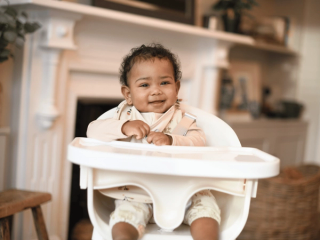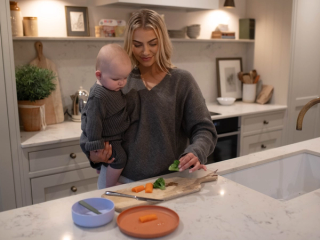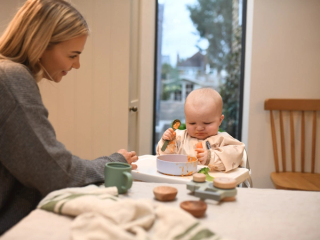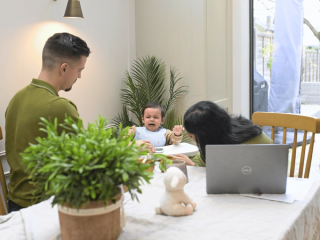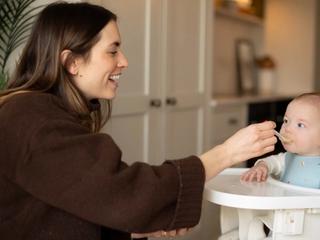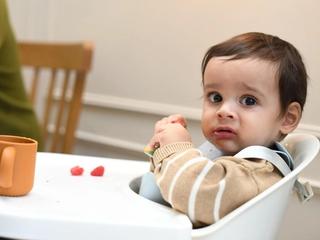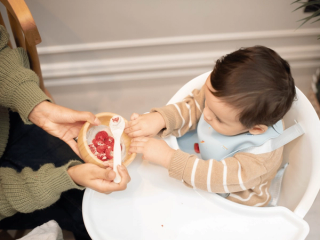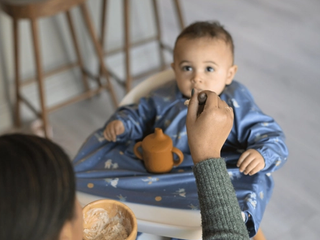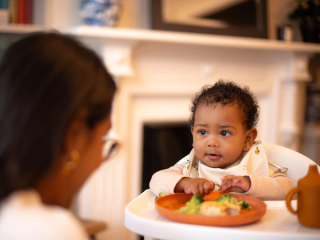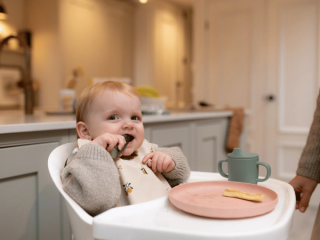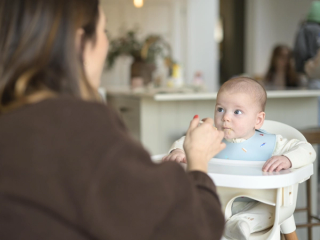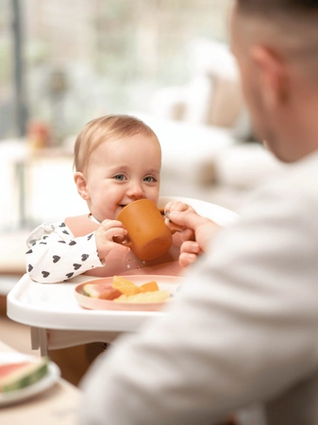
- Home
- Advice Hub
- Baby
- Weaning
- Milk Feeds And Weaning
Milk feeds and weaning
Once solid food is introduced, milk feeds tend to stay constant for a while whilst the solid food increases to three meals a day then after 12 months to include snacks too.
The start of weaning
Did you know that the official term for weaning is complementary feeding? It is called this because when we introduce solid foods to babies it is given in addition to their milk and ‘complements’ the food.
This is an important point as there is a misconception that when a meal is added, a milk feed should be taken away. Actually, when meals are first added, they should be in addition to all the milk that your baby is taking.
Your baby’s nutrition needs – like energy, protein and all the vitamins and minerals – grows with their bodies. The bigger they get, the more they need. For the first six months of life, they get everything they need from milk and the volume they take increases over time. Once solid food is introduced, the milk tends to stay constant for a while whilst the solid food increases to three meals a day then after 12 months to include snacks too.
Reducing milk feeds
All babies are different and reducing milk is not an exact science. You may find that feeds reduce for a few weeks then go back up again a little at times. As long as you are listening to your baby’s cues and letting them feed responsively, this process should happen naturally and without the need for you to get involved or adjust feeds for them. Getting to grips with feeding your baby responsively will really help you to understand reducing milk feeds over the coming weeks and months.
Over time, your baby should naturally start to take less milk and eat more solid food. If you keep encouraging your baby to finish bottles when they are trying to leave them, you may hinder this process happening naturally as it should. If you are breastfeeding, you should continue to feed on demand and over time your baby will start to take less milk, which may mean shorter feeds or may be less frequent feeds or a combination of both!
All babies need different volumes of milk and the amount they take may vary slightly from day to day. This is a positive thing and shows that your baby is able to listen to their body. So, although overall you’ll see the volume of milk decreasing, it is likely to look different each day.
For some very average numbers, an average baby of 7-9 months takes approximately 600mls of formula. When they get to around 12 months this is usually around 350ml. So, during the start of weaning to the first birthday, an average baby drops approximately 1 full feed.
Milk or food first?
This is a question that gets asked a lot. The answer is, if your baby eats solid food well and drinks their milk it doesn’t really matter which goes first.
However, once weaning is established and you are giving three meals a day; if you find that milk or food are regularly being refused, making changes can be helpful. For example, if your baby never wants breakfast, lunch or dinner, have a think. Is there a milk feed close to the meal? If so, it is worth switching around and doing food first to see if that helps.
If you find that your baby’s milk intake drops very suddenly and you’re worried that they aren’t getting enough fluid, try to make sure that milk and food are spaced out enough, so they don’t interfere with each other.
But – the overall message is that if both are taken fine you don’t need to overthink it. Do what fits your routine and your baby.
Types of milk to use
Birth to 6 months: the only type of milk your baby needs until 6 months is breastmilk or formula milk.
6-12 months
You should continue with breastmilk or formula. From 6 months you can introduce full fat cows’ milk in food, though it should not be used as a drink at this stage.
12 months
Breastmilk, formula, cows’ milk are suitable at this age. There are still many benefits to breastfeeding, so if you are able you can continue breastfeeding.
- Cows’ milk – you can switch to full fat cows’ milk, which is the current NHS recommendation.
- Plant- based milks: If your baby is dairy free, you can use any plant based milk except for rice milk due to the potentially high arsenic content. Make sure that the milk you choose has added calcium and iodine, and is preferably an unsweetened variety. Organic milks do not have any vitamins or minerals added to them.
- Growing up milk: If you would prefer to stay on formula, our growing up milks are an option that many families choose and which can help to boost the iron in your little one’s diet.
2 years+
If you wish to continue to breastfeed you can do so, the WHO advise to continue up to 2 years of age. However, we would recommend that you are also offering some drinks of whichever milk you plan to use when you stop feeding as this will help your little one to accept it, when the time comes.
- Cows’ milk – if you are using cows’ milk but you haven’t already switched to semi-skimmed milk, you can do so at 2 years.
Advice & tips

Want to read more? Join the HiPP BabyClub for full access to this article.
As a BabyClub member, you'll get access to a range of exclusive benefits, including:
Monthly competitions
Discounts from our Partners
Expert advice tailored to your little one's age
Weaning recipes
HiPP shop discounts*
*10% off HiPP's online shop does not apply to our First Infant, Anti-Reflux or Comfort Formula Milk.
Important notice: Breastfeeding is best. Follow on milk should only be used as part of a mixed diet from 6 months. Talk to a healthcare professional.




